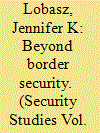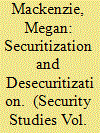| Srl | Item |
| 1 |
ID:
088713


|
|
|
| 2 |
ID:
088714


|
|
|
|
|
| Publication |
2009.
|
| Summary/Abstract |
Environmental security is a topic of study that has gained significant attention in the past few decades. Largely since the end of the Cold War, environmental security has come to represent a way for scholars and policy makers to link the concepts of traditional security scholarship to the environment. Many different conceptions of the relationship between the environment and security appear in academia. Yet despite the diversity of current work on the environment and security, there has been little systematic work done that examines the intersection between environmental security and gender. This article will address the necessity of including gender into the approaches on the environment and security. The environmental security debate exhibits gendered understandings of both security and the environment. These gendered assumptions and understandings benefit particular people but are often detrimental to others. Examining environmental security through a gender lens gives insight into the gendered nature of global environmental politics and redefines the concept in ways that are more useful, both empirically and analytically. The various environmental security perspectives have important, unexplored gender dimensions that must be uncovered so that the security of humans and the environment can be better protected
|
|
|
|
|
|
|
|
|
|
|
|
|
|
|
|
| 3 |
ID:
088709


|
|
|
|
|
| Publication |
2009.
|
| Summary/Abstract |
Theorists of the offense-defense balance frequently note that perceptions of technology, as well as military doctrine, play a role in states' perception of offense dominance or the "cult of the offensive." I argue that gender may constitute the missing link in explaining this misperception and suggest three possible areas of investigation. First, the perceptions and uses of technologies are dependent upon gendered ideologies which encouraged disastrous strategies in the First World War. Second, gender is an integral part of nationalism that promotes offensive policies by defining masculinity in terms of heroic service to the nation. Third, gendered discourses of protection use the language of defense to legitimate offensive policies. By analyzing the roots of perceptions of offense dominance, feminist analysis shows how gender discourses and the production of gender identities are not confined to individuals and the private realm but rather are a pervasive fact of social life on an international scale.
|
|
|
|
|
|
|
|
|
|
|
|
|
|
|
|
| 4 |
ID:
088708


|
|
|
| 5 |
ID:
088711


|
|
|
|
|
| Publication |
2009.
|
| Summary/Abstract |
Research on war, conflict, and terrorism has traditionally focused on the motivations of male combatants to participate in political violence. Such a focus has largely ignored the role of women who wield political violence. This article revisits one of feminist International Relations (IR) most basic questions, "Where are the women?" and encourages an expanded view of security and conflict resolution that asks how combatant women might contribute to current scholarly understanding of conflict and conflict resolution processes. I argue that the thirty-year conflict remained intractable in part because of the exclusion of those Loyalist women who wielded political violence, seriously limiting the British and Irish governments' ability to understand and resolve the conflict. Included in the analysis is interview data collected in an eight-month empirical study conducted by the author in 2006 with thirty women who identify as past or present members or supporters of Loyalist paramilitary organizations in Northern Ireland. The unique perceptions of Loyalist women combatants of four cross-border agreements between 1974 and 2006 are used to illustrate how a feminist approach to conflict resolution can serve as an innovating starting point in theorizing about and attempting to resolve conflict.
|
|
|
|
|
|
|
|
|
|
|
|
|
|
|
|
| 6 |
ID:
088712


|
|
|
|
|
| Publication |
2009.
|
| Summary/Abstract |
With the hypothesis in mind that discrimination against women increases the likelihood that a state will experience internal conflict, this article contends that considering gender is a key part of an effective peacebuilding process. Evidence gathered by studying peacebuilding from a feminist perspective, such as in Rwanda and C te d'Ivoire, can be used to reconceptualize the peace agenda in more inclusive and responsible ways. Following from this, the article argues that a culturally contextual gender analysis is a key tool, both for feminist theory of peacebuilding and the practice of implementing a gender perspective, in all peace work. Using the tools of African feminisms to study African conflicts, this contribution warns against "adding women" without recognizing their agency, emphasizes the need for an organized women's movement, and suggests directions for the implementation of international laws concerning women's empowerment at the local level. The article concludes by suggesting that implementation of these ideas in practice is dependent on the way in which African feminists employ mainstreaming, inclusionary, and transformational strategies within a culturally sensitive context of indigenous peacebuilding processes.
|
|
|
|
|
|
|
|
|
|
|
|
|
|
|
|
| 7 |
ID:
088710


|
|
|
|
|
| Publication |
2009.
|
| Summary/Abstract |
This article focuses on the construction of "soldier" and "victim" by post-conflict programs in Sierra Leone. Focusing on the absence of individual testimonies and interviews that inform representations of women and girls post-conflict, this article demonstrates that the ideal of the female war victim has limited the ways in which female combatants are addressed by disarmament, demobilization, and reintegration (DDR) programs in Sierra Leone. It is argued that titles given to female soldiers such as "females associated with the war," "dependents," or "camp followers" reveal the reluctance of reintegration agencies to identify females who participated in war as soldiers. In addition, I argue that men and masculinity are securitized post-conflict while women-even when they act in highly securitized roles such as soldiers-are desecuritized and, in effect, de-emphasized in post-conflict policy making. The impact of this categorization has been that the reintegration process for men has been securitized, or emphasized as an essential element of the transition from war to peace. In contrast, the reintegration process for females has been deemed a social concern and has been moralized as a return to normal
|
|
|
|
|
|
|
|
|
|
|
|
|
|
|
|